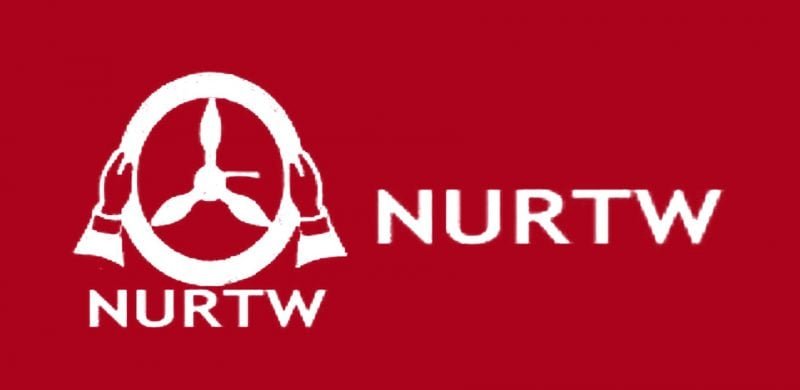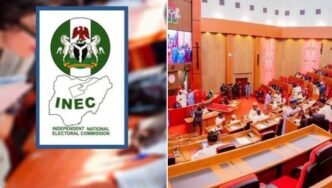Abuja, Nigeria — The Chairman of the National Union of Road Transport Workers (NURTW), Mr. Francis Arhiyor, has decried the deplorable state of Nigeria’s road network, attributing the rising cases of armed robbery and kidnapping on highways to poor infrastructure.
Speaking on Wednesday, Arhiyor said the deteriorating condition of major federal and state roads across the country has created fertile grounds for criminals to operate with ease, endangering commuters and transport workers alike.
Bad Roads, Rising Insecurity
The NURTW boss expressed deep concern over what he described as a “deadly connection” between Nigeria’s decaying road network and the surge in highway-related crimes.
“The truth is that if the roads are good, the cases of armed robbery and kidnapping will be reduced because these hoodlums have been taking undue advantage of the bad spots to strike and perpetrate their heinous crimes,” Arhiyor stated.
According to him, criminals exploit failed sections of highways, where vehicles are forced to slow down or stop abruptly due to potholes, collapsed bridges, and erosion, giving attackers the upper hand.
Transport unions, motorists, and passengers have long lamented the danger of traveling across Nigeria’s major routes — particularly in regions where the roads have become impassable.
Highways of Fear: Where the Problem Persists
Several major roads have become notorious flashpoints for kidnappings and robberies due to their poor state. These include:
- The East–West Road, which links key parts of the Niger Delta region — from Warri in Delta State to Port Harcourt in Rivers State — now riddled with potholes and sections completely washed away by erosion.
- The Abuja–Kaduna Expressway, one of the most critical routes in the country, where bad portions have contributed to repeated ambushes by kidnappers.
- The Benin–Ore–Shagamu Highway, where long stretches of failed pavement have turned into hideouts for armed gangs.
- The Lokoja–Okene–Benin corridor, known for gridlocks and recurring criminal attacks.
Arhiyor emphasized that these roads have not only crippled transport operations but also become traps for innocent Nigerians who fall prey to armed bandits.
“Our members are no longer safe. Drivers are being kidnapped or robbed on a daily basis. When vehicles get stuck or slow down due to bad spots, these criminals attack without fear. Many of our members have lost their lives and property,” he lamented.
Call on Federal Government and States
Mr. Arhiyor appealed to the Federal Government and state authorities to urgently address the situation by rehabilitating key highways across the country, particularly the East–West Road, which he described as “a national disgrace.”
“We are appealing to the Federal Government to fix the failed East–West highway in the Niger Delta region without further delay. The road is a lifeline for trade and transport in that area, yet it has been left to collapse,” he said.
He added that road construction and maintenance should be treated as a security priority, not merely an infrastructure issue.
“When roads are good, people move faster, the economy thrives, and criminals lose their hiding spots. But when roads are bad, insecurity thrives. It’s that simple,” Arhiyor stressed.
Transport Sector Bearing the Brunt
Nigeria’s road transport sector, which carries over 90 percent of passenger and freight traffic, continues to bear the heaviest cost of the country’s deteriorating infrastructure.
According to data from the National Bureau of Statistics (NBS) and road safety reports, over 5,000 road crashes occur annually — many attributed to bad roads and lack of maintenance. Beyond accidents, transport unions like the NURTW report escalating cases of driver kidnappings, vehicle thefts, and fatal attacks along highways.
The situation has also led to increased transport fares, reduced night travel, and disruptions in the movement of goods and agricultural produce, further straining Nigeria’s fragile economy.
Security Agencies Overstretched
While security agencies have intensified highway patrols and established joint military-police task forces in several regions, the scale of the problem remains overwhelming. Poor road conditions slow down response times and limit patrol coverage.
A senior transport analyst in Abuja noted that security operations are most effective when infrastructure supports mobility.
“It’s not enough to deploy more soldiers or police on the roads. If the terrain itself is broken down, their efforts are undermined. Fixing the roads is part of fixing security,” the analyst said.
Economic and Social Implications
The link between road conditions and security is more than a coincidence. Poor infrastructure not only exposes citizens to danger but also drives up the cost of doing business.
- Logistics companies face rising vehicle maintenance costs due to damaged roads.
- Farmers and traders lose perishable goods as travel time doubles on bad routes.
- Communities along failed highways experience isolation, stunted commerce, and mass migration.
For many Nigerians, what used to be routine inter-state travel has now become a risk-laden journey, with drivers forced to navigate pothole-filled stretches under constant fear of attack.
Public Outcry and Renewed Demands
Public pressure has mounted in recent months for the government to accelerate road reconstruction projects. Civil society groups and transport unions have held town-hall meetings across states like Rivers, Delta, and Edo, calling for accountability in federal road contracts.
In some regions, local communities have resorted to self-help measures, filling potholes with gravel and sand — a temporary solution that often worsens during the rainy season.
Experts’ Perspective
Infrastructure experts say Nigeria’s road decay is a symptom of decades of neglect, poor maintenance culture, and corruption in contract execution.
Engr. Tunde Oyekan, a transport engineer, explained that inadequate drainage systems, substandard construction materials, and overloading of trucks have also contributed to the rapid deterioration of highways.
“Until Nigeria adopts a sustainable maintenance plan and enforces strict quality control on construction projects, the cycle of bad roads, insecurity, and economic losses will persist,” Oyekan said.
A Call for Integrated Action
The NURTW Chairman urged the government to implement a national road safety and infrastructure task force, combining the efforts of the Federal Ministry of Works, Federal Road Safety Corps (FRSC), Nigerian Police, and local governments.
He said such collaboration would allow better coordination in road maintenance, surveillance, and emergency response — reducing opportunities for criminals to exploit weak infrastructure.
“Fixing roads is fixing security. Until we understand that, we’ll keep losing innocent people to kidnappers and robbers,” Arhiyor reiterated.
Conclusion
The warning from the National Union of Road Transport Workers underscores a growing national concern: Nigeria’s collapsing road network is not just an economic burden — it is fast becoming a security threat.
As armed robbery and kidnapping incidents continue to rise, transport workers and commuters remain on the frontline of danger. The NURTW’s message is clear — good roads save lives, protect property, and strengthen national security.
The onus now lies on the government to act decisively, turning its promises of infrastructure renewal into visible, life-saving realities across Nigeria’s highways.














